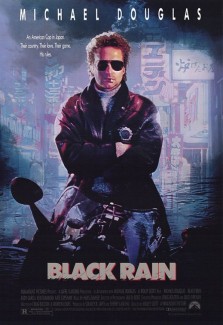Black Rain (Ridley Scott, 1988): USA
Reviewed by Richard Feilden. Viewed on iReel streaming
 I’m going to step back and revisit a blast from my past with this review. I remember being a big fan of Ridley Scott’s Black Rain when it came out, a time when I was too young to have actually been watching it! So I’m risking tarnishing an old memory now that I’m (hopefully!) a more astute and cultured viewer. Thankfully, while it certainly doesn’t inhabit the same hallowed ground as Scott’s masterpieces, this is a great looking, though sometimes fairly dumb, member of the 80s buddy-cop genre.
I’m going to step back and revisit a blast from my past with this review. I remember being a big fan of Ridley Scott’s Black Rain when it came out, a time when I was too young to have actually been watching it! So I’m risking tarnishing an old memory now that I’m (hopefully!) a more astute and cultured viewer. Thankfully, while it certainly doesn’t inhabit the same hallowed ground as Scott’s masterpieces, this is a great looking, though sometimes fairly dumb, member of the 80s buddy-cop genre.
So, what do you need for a buddy-cop film? Well, first of all you need your wildcard, rebellious, no-time-for-authority detective. Here we have Nick Conklin, played by Michael Douglas. He rides a motorbike, so right there we know he’s edgy! He needs a partner of course–someone a little more straight-laced, honest and naïve. Black Rain gives us two for the price of one, with Andy Garcia playing his partner Charlie, and Ken Takakura playing their Japanese liaison Masahiro. Then we just need to have him accused him of a crime he didn’t commit (as opposed to those he did) and provide a psychotic villain for him to apprehend. Throw in a token love interest and you have an 80s cop film.
The specifics of this story involve two New York cops who end up in the middle of a Yakuza hit–one that conveniently occurs in the restaurant where they are taking their lunch break. The killer is caught, but people in high places demand his extradition to Japan, and Nick and Charlie are assigned to escort him home. However, the language barrier means that they end up handing the gangster back to his own men instead of the Japanese police. Already under suspicion of corruption back in New York, Nick can’t leave without clearing his name…
So, what sets this film apart from its lesser counterparts? The first thing is its director. Ridley Scott has given us classics including Alien, Blade Runner, Thelma & Louise and Gladiator. His trademark is his ferocious attention to the visuals in his films, and that careful eye is certainly in attendance here. It isn’t his best work, but Scott’s second (or even third, fourth or fifth) best is enough to lift this film above many of its contemporaries. From the grimy, car filled streets of New York to the tidy yet hectic sidewalks and clubs in Japan, Scott’s eye for detail is evident, with each scene revealing a world of information about its inhabitants without anyone having to say a word.
Secondly, there is the story. While, as I said above, it does hit all the buddy-cop buttons, it approaches them in a different way. There are far fewer action sequences in this film than you might see in something like Lethal Weapon. Instead we get to spend time watching the characters interact, something that is essential for them to develop, and for the difference between the Americans and the Japanese to be illustrated. In many ways this film has more in common with The French Connection than with Die Hard. True, most of the differences are based on sweeping generalizations and cultural stereotypes, but the fact that they are explored, rather than simply used to define the Japanese as ‘the other’, gives this film a leg up on the rest of the crowd.
The cast members also acquit themselves well. Douglas and Garcia are fun to watch and Takakura provides a good counterpoint with his quiet, thoughtful presence. Even love interest Kate Capshaw manages not to infuriate and annoy, with a performance that leaves her shrill Temple of Doom routine far behind her.
At the end of the day though, the film is simply a lot of fun. You won’t come away with questions about the very nature of humanity, or a new appreciation of feminism, but you will have a good time and, in this instance, that is enough.
About this entry
You’re currently reading “Black Rain (Ridley Scott, 1988): USA,” an entry on Student Film Reviews
- Published:
- 06.30.09 / 8pm
- Category:
- Films, Online Films
1 Comment
Jump to comment form | comments rss [?] | trackback uri [?]